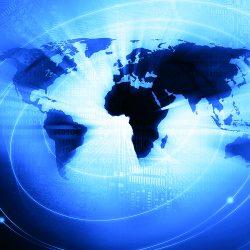Unlocking Africa’s global potential

Graham Bright of Euro Exim Bank surveys Africa’s commercial landscape, and examines how AfCFTA can help get the best out of this dynamic continent
Having been invited by this magazine to give my thoughts on Africa’s global trade potential and its appeal to investors, I have to admit the prospect of rapid AI content generation become too much of a temptation. After all, why default to years of experience, market knowledge and research skills, when apparently ChatGPT could do the heavy lifting for me.
So, I asked the internet, “Why is it important to watch out for Africa in international trade?” And here’s what the bot had to say:
“There are several reasons why it is important to watch out for Africa in international trade:
1. Market potential – Africa is home to over 1.3 billion people, which represents a significant market potential for businesses looking to expand their operations globally. With a growing middle class and an increasing number of consumers, Africa offers a range of opportunities for businesses to tap into.
2. Natural resources – Africa is also rich in natural resources, including oil, minerals, and agricultural products. This makes it an important player in global commodity markets and a source of vital resources for many countries around the world.
3. Economic growth – Despite facing several challenges, many African countries have experienced significant economic growth in recent years. This growth has been driven by a range of factors, including increased investment in infrastructure, improved governance, and a growing entrepreneurial culture.
4.Regional integration – The African Continental Free Trade Area (AfCFTA) was launched in 2021 and is expected to create the world’s largest free trade area.
Overall, watching out for Africa in international trade is important because it represents a significant opportunity for businesses and countries around the world to tap into a growing market, access valuable resources, and participate in regional integration efforts.”
And there you have it. Whilst the technology is impressive and there is some useful information here, there is nothing that we didn’t know already. Note to market analysts: your jobs are safe, for now! There is no meat, no bones, facts, figures or crucial talking points. Indeed, the real stories, prospects and opportunities for Africa go so much deeper.

Why AfCFTA holds the key
The key to unlocking improved welfare, quality of life, jobs, boosting trade, eliminating tariffs and promoting sustainable development lies in initiatives such as the African Continental Free Trade Area (AfCFTA). And the first aspect is the elimination of tariffs on 90% of goods. The reduction of barriers to trade in services is aimed at increasing Africa’s income by $450bn by 2035 and enabling the African economy to reach the $29tn mark by 2050.
With lofty ambition and a real, tangible appetite for change, empowering youth and women, the social potential for Africa is clear: reducing poverty, changing global perceptions, and taking its place as the economic powerhouse of the future.
And with this ambition comes real plans with renewed emphasis and strategy on Trade in Services in a number of priority areas, namely: tourism, transport, business, communications and finance. With tightening supply chains in many jurisdictions, traditional sources are under deep scrutiny.
And with the ongoing conflict in Ukraine causing critical resource scarcity and threats to supply chains, the continent of Africa is a viable, plentiful source of supply. It is no surprise that everyday goods, with low manufacturing costs, such as batteries, tea, coffee, processed meat products, corn starch, sugar, dried fruits, and sisal fibre, all feature heavily in the desirable product list ready for export around the globe.
Every collaborative agreement needs a strong legal framework, guidelines and protections for participants, and AfCFTA is no exception. The guidelines are essential to ensure that market access is not monopolised by large corporations, but importantly, structured so that smaller corporates, SMEs, women, and younger entrepreneurs may compete in all business sectors and to embrace digital trade.
Economic integration is essential for African nations, supported by public-private partnerships and alternative investments, as is respect for intellectual property and firm competition policies.
Also of vital importance is the support of smaller businesses by state parties, issuing formal certificates of origin and customs declaration forms to facilitate smoother trade flows.
With any change comes costs, and whilst in a period of transition, there will be an immediate need to reorganise supply chains, build new relationships, provide retraining, and procure new, more efficient machines and equipment. Fortunately, without legacy plant, systems and communications networks, many African countries are well positioned to take competitive advantage by purchasing and implementing new technology and the latest machinery for innovative and cost-effective manufacturing processes. Making the free trade agreement work has also led to a number of continent-wide initiatives which will be crucial to long term success.
Creating a future-ready infrastructure
With a general increase in global costs, non-tariff barriers, continued inefficiency in transport and logistics, cumbersome non-standard regulatory mandates and lengthy customs procedures, it’s fair to say Africa can and must work on improving the supply-side. By implementing the AfCFTA, there is a clear ambition to take a lead in transport information, energy and communications technology (ICT), all of which will allow smaller companies and countries to compete more effectively internationally.
But no trade can be effective between countries where conflict exists. Political stability, attracting trusted investment and building a skilled workforce is key to economic integration, fruitful networks and long-term sustainability. This is all vital for businesses to succeed.
Under the framework of AfCFTA, implementing policies at a continental level rather than as isolationist regimes is also crucial. This way, regulations, policies and processes may be shared, standardised, harmonised and speedily adopted. This will enable easier access to trade with a wider market, not only within the African continent but to a global audience.
According to the UN, with 1.4 billion people, Africa is home to 16.7% of the world’s population, and 70% under the age of 30. Of vital importance is the development of skills, higher education, raising levels of employability and opportunities to support skill-intensive manufacturing industries.
The guidelines within AfCFTA will be invaluable in promoting innovation and technology, supporting new competitive markets, education hubs and encouraging startups, which in turn supports economic inclusion.

Plugging trade gaps
Another area where Africa must improve in order to be globally competitive is reducing trade gaps and single payments. On a continent where imports continue to vastly exceed exports, the scale of the problem is massive, with an estimated trade gap of $100bn in 2022.
Expensive foreign exchange, mis-invoicing, regulation, bureaucracy, corruption, lack of liquidity and trust remain perennial problems. This is further compounded by the fact that only 40% of African trade is bank-intermediated, due to complexity, reach, terms and cost. One significant project in the region will be to increase trade and money flows through the creation of a continent-wide single payment infrastructure with the assistance of the central banks.
Financial service providers will also be able to connect as participants, and by concentrating efforts, standardising processes and implementing new cost-effective technologies, benefits may pass to traders, and reduce money laundering, fraud and potential for corruption. And what will the net gains be? Lower conversion costs for the 42 African currencies, savings of an estimated $5bn annually plus a reduction in demand for the expensive US dollar and other fiat currencies.
Going digital
Continued reliance on a mass of inefficient hard-copy administration across the business sector continues to hamper trade. From requirements of copies and wet signatures, to different formats across the many trade networks, the delivery, verification, and actioning of business activity remains challenging.
There is no doubt that use of new technologies such as blockchain, in the appropriate areas, can greatly improve the flow of documents and provenance in trade. However, depending on where you are in the world, we are still perhaps at the infancy in use and global acceptance of this technology. Certainly in Africa this is the case.
To conclude, the global business community is excited about the changes taking place in Africa, and must offer support not only through astute investment, but also in the just transition to a net zero economy.
The time has come for Africa to truly emerge and to take its place among the world’s agricultural, manufacturing, and technology powerhouses. A position to which it aspires, and which it richly deserves. Because if ChatGPT was right about one thing, it’s that Africa represents a significant opportunity for businesses and countries around the world to tap into a growing market – and that’s an understatement.
About the author

Dr Graham Bright is Head of Compliance at Euro Exim Bank Ltd.
Further information


